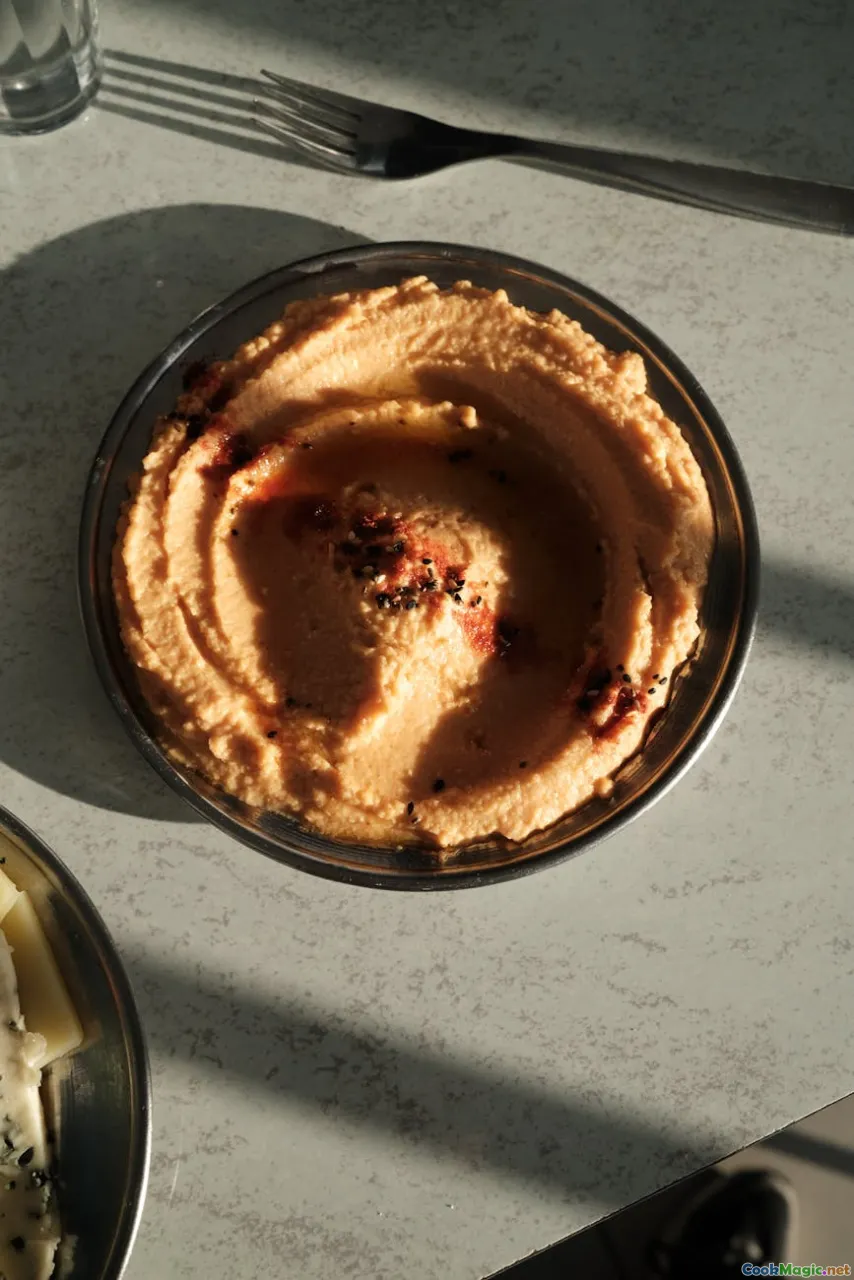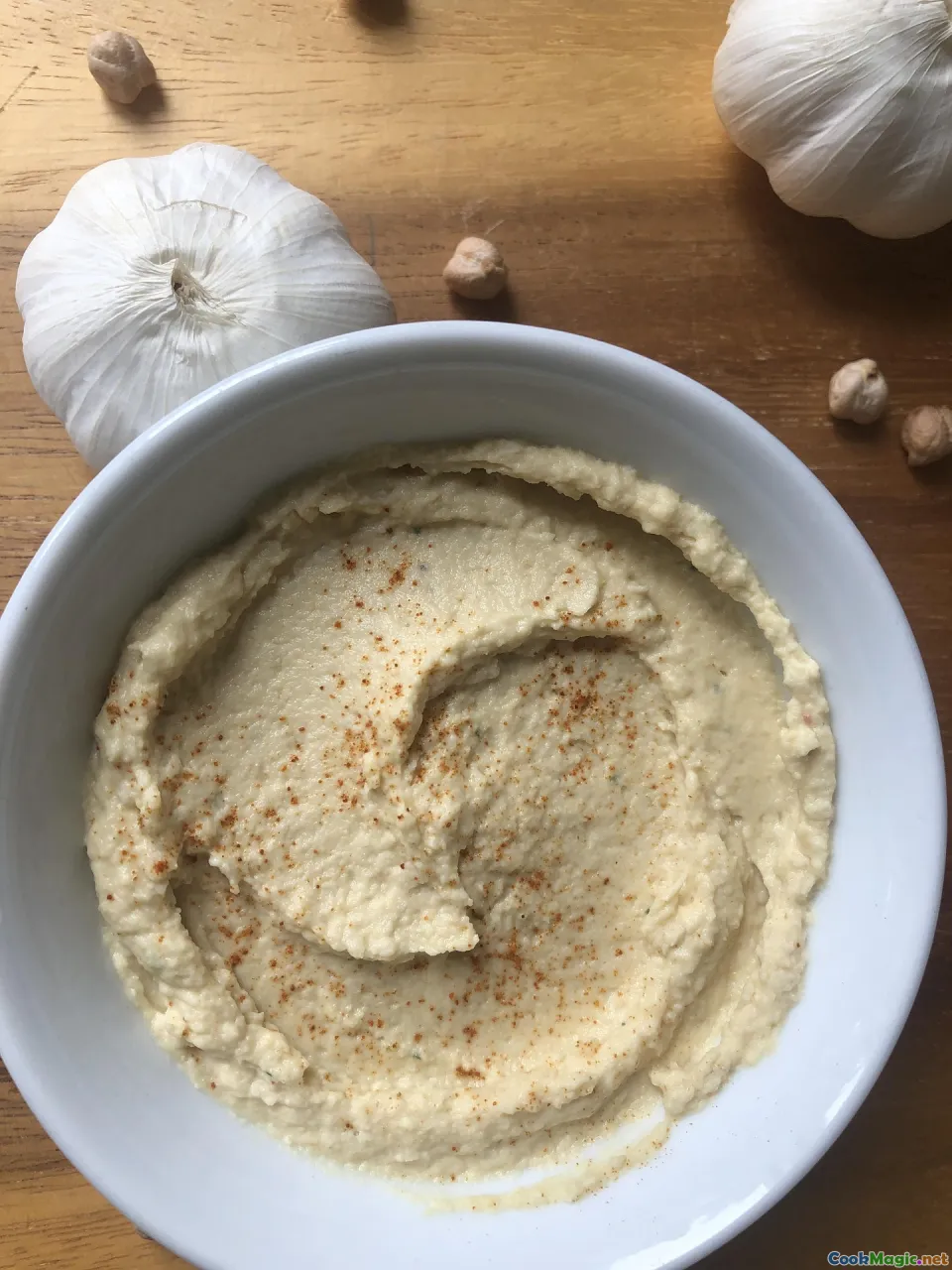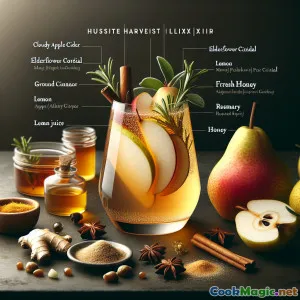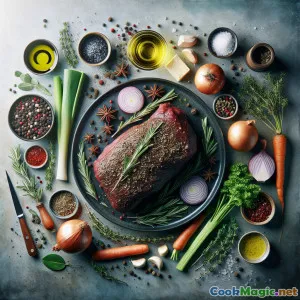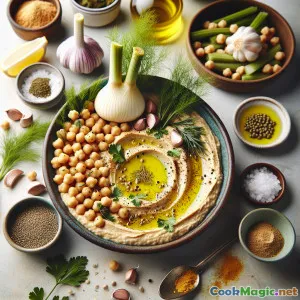
Hummus Setoso con Olio di Finocchio Arrosto Infuso
(Velvety Hummus with Roasted Fennel-Infused Oil)
(0 Recensioni)0
4,008
settembre 07, 2025
Segnala un problema
Ingredienti
-
400 grams Ceci (cotti, scolati)
(Canned or home-cooked, drained and rinsed)
-
1 medium Bulbo di finocchio
(Trimmed and sliced roughly)
-
6 tablespoons Olio d'oliva
(Preferibilmente extravergine)
-
3 tablespoons Tahini
(Well-stirred)
-
1 clove Aglio
(Pelato)
-
2 tablespoons Succo di limone
(Spremuto fresco)
-
2-4 tablespoons Acqua fredda
(As needed for creamy texture)
-
3/4 teaspoon Sale marino
-
1/4 teaspoon Pepe nero macinato
-
1/2 teaspoon Cumino macinato
-
1 tablespoon Prezzemolo fresco
(Tritato, per guarnire)
-
1 teaspoon Semi di nigella
(Per guarnire)
(Canned or home-cooked, drained and rinsed)
(Trimmed and sliced roughly)
(Preferibilmente extravergine)
(Well-stirred)
(Pelato)
(Spremuto fresco)
(As needed for creamy texture)
(Tritato, per guarnire)
(Per guarnire)
Nutrizione
- Porzioni: 4
- Dimensione Porzione: 1 small bowl (about 100g)
- Calories: 420 kcal
- Carbohydrates: 38 g
- Protein: 10 g
- Fat: 27 g
- Fiber: 8 g
- Sugar: 3 g
- Sodium: 530 mg
- Cholesterol: 0 mg
- Calcium: 85 mg
- Iron: 3 mg
Istruzioni
-
1 - Roast the Fennel:
Preheat oven to 200°C (390°F). Toss sliced fennel with 2 tablespoons olive oil, salt, and pepper. Spread on a baking tray and roast for 30 minutes, turning halfway until golden and fragrant.
-
2 - Prepare Roasted Fennel Oil:
Once fennel is roasted, transfer the fennel and oil into a small saucepan. Add the remaining 4 tablespoons of olive oil. Warm gently on low heat for 5 minutes, then let cool. Strain oil into a bowl and reserve.
-
3 - Blend the Hummus:
Combine chickpeas, tahini, garlic, lemon juice, 2 tablespoons of the cooled fennel oil, optional cumin, salt, and pepper in a food processor. Blend until coarse. Gradually add cold water until creamy, scraping sides as needed.
-
4 - Adjust Seasoning and Texture:
Taste the hummus and add more lemon, salt, or water to preference until light and smooth.
-
5 - Serve and Garnish:
Spoon hummus into a serving bowl. Drizzle generously with roasted fennel oil. Top with chopped parsley and nigella seeds if desired. Serve with warm pita, crudités, or crackers.
Preheat oven to 200°C (390°F). Toss sliced fennel with 2 tablespoons olive oil, salt, and pepper. Spread on a baking tray and roast for 30 minutes, turning halfway until golden and fragrant.
Once fennel is roasted, transfer the fennel and oil into a small saucepan. Add the remaining 4 tablespoons of olive oil. Warm gently on low heat for 5 minutes, then let cool. Strain oil into a bowl and reserve.
Combine chickpeas, tahini, garlic, lemon juice, 2 tablespoons of the cooled fennel oil, optional cumin, salt, and pepper in a food processor. Blend until coarse. Gradually add cold water until creamy, scraping sides as needed.
Taste the hummus and add more lemon, salt, or water to preference until light and smooth.
Spoon hummus into a serving bowl. Drizzle generously with roasted fennel oil. Top with chopped parsley and nigella seeds if desired. Serve with warm pita, crudités, or crackers.
Ulteriori informazioni su: Hummus Setoso con Olio di Finocchio Arrosto Infuso
Hummus with Roasted Fennel Oil: Elevating a Classic Dip
Hummus is an age-old staple in Middle Eastern cuisine, finding its way into meals and gatherings with its airy, creamy richness and invigorating lemon and garlic notes. In many modern kitchens, including those in England, hummus has become equally beloved—a testament to its versatility, nutritional value, and deliciousness. Yet here, the recipe takes on a little flourish, drawing upon typical English produce like fennel. The roasted fennel oil not only adds a distinctive aromatic twist but elevates the humble chickpea puree into something more sophisticated, perfect for a starter or centerpiece on a mezze table.
The Magic of Fennel
Fennel, widely cultivated in the UK and Europe, offers an anise-sweetness and subtle grassy freshness when raw, and undergoes a dramatic mellowing and caramelization when roasted. Infusing the oil for your hummus topping with roasted fennel transforms it into a gently perfumed elixir, balancing earthiness with deep flavor. This English twist harmonizes surprisingly well with the roots of this Middle Eastern comfort food.
Cultural Nuances & History
Originating from the Levant, hummus holds a profound cultural significance across Lebanon, Israel, Syria, Jordan, and beyond—as both daily fare and festive treat. It’s typically served with khubz (flatbread), and its endless regional variations range from smoky to spiced, chunky to silken. Plant-based, filling, and loaded with nutrients, hummus fuels from farmers to scholars, crossing many dietary preferences.
By leaning on fennel—part of “Old World” British cookery traditions—the recipe bridges the Levantine classic and English ingredient-centric innovation. English cuisine, too, is becoming ever more explorative with healthy vegan dishes and creative infusions of world cuisines.
Tips, Tricks & Success
1. Chickpea Creaminess: For hurrah-level smoothness, gently simmer canned or cooked chickpeas for 10 minutes before blending, removing tough skins if extra silky texture is desired. Start blending without added water, then drizzle it in slowly.
2. Next-Level Oil: If you love flavored oils, the roasted fennel oil can double as a salad drizzle or roasted veg finishing oil. Let it infuse at gentle heat—don’t fry!
3. Adjust to Taste: Lemon’s tartness and tahini’s depth are personal; don’t be shy about adjusting both. Traditional hummus is quite tangy and rich, but new palates might like it milder.
4. Light Touch of Cumin: A little cumin is classic and adds subtle warmth but is entirely optional here, as the oil’s flavor can shine on its own.
5. Garnishes Make the Dish: Sprinkle with nigella seeds—they’re nutty and peppery and invoke Middle Eastern authenticity. Parsley is fresh and brightens everything up! Try also a few reserved roasted fennel shavings for drama.
Why This Recipe is Unique
- Distinctive Fennel Oil: Adds an aromatic sophistication beyond classic olive oil.
- United Traditions: A bridge between classic British ingredient admiration and Middle Eastern culinary history.
- Nutrition Focused: High protein, naturally vegan, and replete with healthy fats and fiber.
- Entertaining Ready: Vibrant presentation and flavor, perfect for parties or refined snacking.
Serving Suggestions
Serve with warm pita, oatcakes (an English favorite), crusty bread, or a rainbow of fresh vegetables. It’s perfect with lightly cured trout for contrast (if not keeping it vegan!) or as an accompaniment to spiced lamb for Levantine feasts.
Final Thoughts
This “Hummus with Roasted Fennel Oil” truly stands out in a sea of classic dips. Roasting and infusing a classic English vegetable evokes a second layer of depth that will amaze both hummus novices and connoisseurs. It’s modern, hearty, and more than just a light lunch—it’s an inviting shared starter, conversation spark, or quick, nutritious snack. Whether serving at a picnic by the Thames or a mezze spread amid swirling conversation, this dish is a meeting point of tradition, health, and gastronomic innovation.

